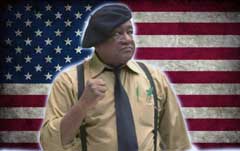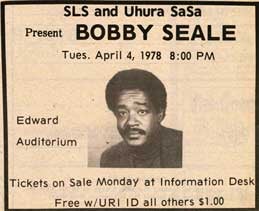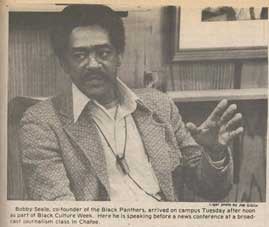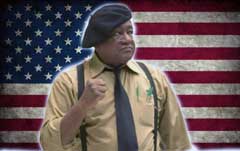 KINGSTON, R.I. Feb. 11, 2015 – When former Black Panther Bobby Seale visited the University of Rhode Island three decades ago he blasted South Africa’s apartheid as a “cancerous tumor” on mankind.
KINGSTON, R.I. Feb. 11, 2015 – When former Black Panther Bobby Seale visited the University of Rhode Island three decades ago he blasted South Africa’s apartheid as a “cancerous tumor” on mankind.
The country’s system of segregating the non-white majority has since been dismantled, but Seale is still in one piece, as outspoken as ever about racial injustice in the world.
And he’s bringing his views back to URI in a talk Thursday, Feb. 26 to inaugurate the newly created Race, Violence and Democracy Colloquium, sponsored by URI’s Africana Studies department.
The talk, free and open to the public, will start at 6 p.m. in the Center for Biotechnology and Life Sciences, 120 Flagg Road, on the Kingston campus.
Barry J. O’Connor Jr., professor of Africana Studies, says the group wanted to bring in a speaker who is not only dynamic but could speak from personal experience about the civil rights movement.
Seale was a perfect candidate. Born in Texas, Seale studied engineering at Merritt College in Oakland, Calif., where he met Huey Newton, another black activist. In 1966, Newton and Seale created the Black Panthers, adopting the doctrine of self-determination, crystallized in the declaration, “Power to the People.” The group symbolized revolution and the radical left.
Following the 1968 Democratic National Convention, Seale was one of the original Chicago Eight defendants charged with conspiracy and inciting to riot. The charges were eventually dropped and Seale was charged with contempt of court for his outbursts, which resulted in him being shackled to a chair and gagged. He was sentenced to four years in prison.
“We believe that the University and the community would benefit immensely from the experience of hearing one of history’s great leaders,” says O’Connor. “We’re honored to host him at URI.”
This will be the third visit to URI for Seale, who is 78 now and lives a quiet life in Oakland. In April 1978, he gave a talk for Black Culture Week in which he criticized President Jimmy Carter’s economic stimulus program, saying it did not do enough to help people who are poor. URI student Patrick Quinn ’79, news editor for The Good 5 Cent Cigar, covered the event.
But it was Seale’s September 1985 appearance that sparked controversy. Seale and South African filmmaker Stuart Pringle debated apartheid, with Seale calling the policy of racial segregation “a cancerous tumor in the hearts of all humanity,” according to The Providence Journal. Pringle characterized apartheid as a “petty issue.”
“Ronald Regan’s executive order on apartheid is a bunch of crap,” Seale said at the time. “We need strong American sanctions.”
 The debate in Edwards Hall drew more than 200 people, some so overcome by emotion they could barely speak through tears. Seale called Pringle a “racist.” Pringle accused Seale of name-calling.
The debate in Edwards Hall drew more than 200 people, some so overcome by emotion they could barely speak through tears. Seale called Pringle a “racist.” Pringle accused Seale of name-calling.
The Feb. 26 talk promises to be more subdued. Seale is no longer advocating armed revolution against the power structure. These days, his focus is on youth education programs, mentoring young politicians and grassroots community activism.
He appears in television documentaries about the turbulent Sixties and lectures at colleges throughout the country about his lifelong struggle against institutionalized racism.
In fact, URI student Alexandra Castillo reached out to Seale to invite him to URI. “What she did was an amazing accomplishment,” says O’Connor. “It shows a lot of initiative and interest – and that’s exactly what URI is about.”
Seale has also turned his passion for barbecuing into a career, with the publication of Barbeque’n with Bobby Seale: Hickory & Mesquite Recipes, which joyously documents the African roots of barbecue and includes recipes such as Spicy-Hot-Hickory-Pepper Baste-Marinade. For the record, Seale learned how to barbecue during his boyhood summers from an uncle, Tom Turner, who owned the Bar B Que Pit restaurant in Seale’s native Liberty, Texas.
Other sponsors of the talk are: Division of Student Affairs; Office of Community, Equity & Diversity; Department of Engineering; College of Arts & Sciences; Department of Psychology; Graduate School; University Honors Program; Office of the Provost; College of the Environment & Life Sciences; Talent Development; and Ted Shear, academic advisor for Talent Development.
“The accomplishments of the civil rights movement have somehow been absent from the dialogue in our nation with the passing of time,” says O’Connor. “Each generation that passes seems to become further removed from the movement’s successes. Securing the participation of an original source from that time is an amazing opportunity.”
For more information about the talk, email O’Connor at magalcolm@uri.edu or call him at 401-455-6093. Copies of Seale’s cookbook will be available to buy after the talk – and he’ll sign them too.
“I think it’s important that we inform all citizens of the diverse ideological perspectives and strategies within the African community in America and recognize that the actions of the Black Panther Party contributed significantly to a more complete conception of freedom for all Americans,” says Earl Smith III, assistant dean in the College of Arts and Sciences and an adjunct instructor in Africana Studies. “We hope that the colloquium will encourage future scholar activists.”
Pictured above:
In front of the American flag, Bobby Seale, co-founder of the Black Panther Party and a political activist, will speak at the University of Rhode Island Feb. 26. Photo courtesy of Barry O’Connor.
Images from the Good Five Cent Cigar, the URI student newspaper. Published April 1978.

